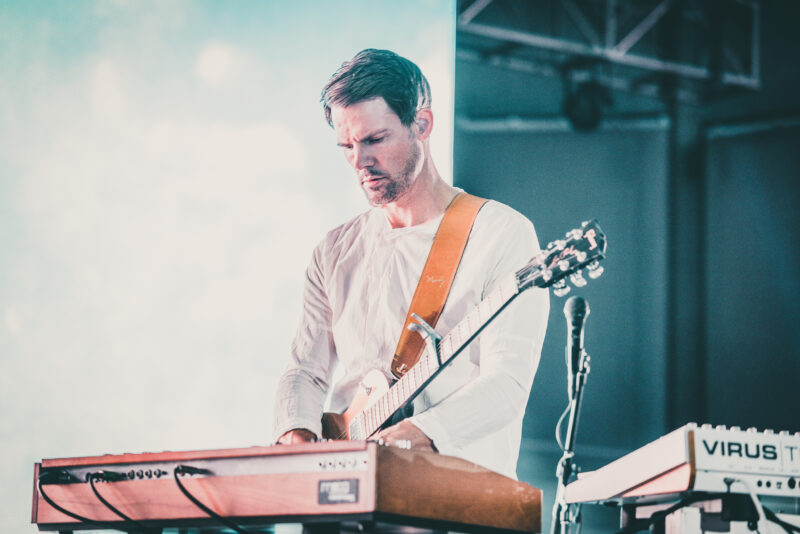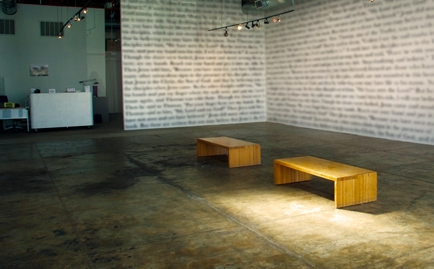Scott Hansen is thinking about his fans. Tycho, the Grammy-nominated electronica artist has spent the last decade building up a devoted following of his invigorating music. Albums like Awake and Dive have made him a staple of the electronic and dance music genre, and now he’s interested in figuring out how to actually invest in those fandoms — evolving the artist/listener relationship into one of mutual, two-way communication. 
To that end, Hansen is trying to build a better online community for fans, utilizing web3 technology to craft a new way of building real relationships with the people who like Tycho. And through this, he’s hoping to tear down some of the more toxic elements of online fandom and create a new, better, more human way to interact with the musicians you love.
How do you connect your creativity with the advances of technology?
That’s hard to say. It used to be, like, what’s the new social media network that I’m supposed to use this year? Am I supposed to get TikTok or whatever? It seemed like it was always some new thing, and keeping up with that was always weird to me, because you’re at the mercy of that platform and whoever runs it. That’s going to change over time, and is going to start to filter and color the message and color the interaction you have with fans.
So for me, this was instantly like, “OK, this is where we can have more control, have more freedom, and fans can have more control and freedom as well.” It just feels like a more direct connection. So for me, this felt like it was worth investing the time to really truly understand it and build something out of it.
It seems like you’re trying to find new ways to stay connected to fans.
Yeah. I started a blog in 2006, the ISO50 blog, which was mostly graphic design and music and art and culture and stuff. It started as a way for me to share my inspirations in addition to my portfolio, so I was sharing other people’s work and just old magazines and cool posters, stuff like that. A community of people grew up around that and felt really directly connected, because you’re in the comments and you kind of know these people.
You start to meet them at shows or you end up working with them, because a lot of other people in there were graphic designers or like-minded artists that I ended up connecting with. I always look back on that as like, “Oh, that was so cool.” It felt like we were all in this secret club together or whatever, and social media never really felt like that,
but social media was cool in its own way. It was a broad, vast swath of the population. Everyone was using it. You didn’t have to understand how to interact with a certain site or go to the specific place. There’s a lot of people on Instagram, MySpace and other platforms, so that had its place.
But I think for this, you’re right there, and something about that felt like I was talking directly with these people or I was in the same room. You post a comment on Instagram, and then there’s this slow process, and then maybe somebody responds to it and it doesn’t feel like a conversation. It feels more like a bulletin board thread or something. This felt like very much more in the moment and a two-way conversation.

How does that connection to fans influence your art?
I think it has a huge influence. Just because I always think of Tycho fans as a lot of them are: They’re just really passionate and invested in the project. We’re not the biggest band in the world, or biggest project, or anywhere near it, but we have this really devoted fan base, and that’s what has allowed this thing to go on as long as it has, and has allowed me to be independent and not be really beholden to anybody and be able to make artistic decisions based on exactly what I would want to do instead of what somebody else is going to like or a label is going to want. That’s something that I’ve always been really conscious of.
I just did a sunrise set at this festival in Ohio, and I was talking to people. All these people off the Discord were going to it, so I was actually talking to them about it and being like, “Oh, when you go to these sets, what are you expecting?” Because a Tycho set with the band, obviously we’re playing all Tycho.
But for the DJ sets, I like to play stuff that’s inspiring to me, that I didn’t necessarily make. And also it’s an opportunity to hear music that you haven’t heard 10,000 times or played every day of your life on a loud sound system and be connected with the crowd during that moment.
Anyways, they gave me a bunch of cool feedback and that actually informed the way I created that set, and then I talked to them afterwards and got their reactions to it. That was just such a cool experience to really feel like you were getting their perspective before and after.
Do you think this is the future of fandom?
I think so. There’s also an aspect to it where there’s a lot of crowdfunding albums. If you’re an emerging artist and you’re coming up and you’re trying to quit your day job and you’re trying to carve out some space in your life to focus on art, if you can find a group of people and fans that are willing to help participate in that process, I think there’s a lot of tools now that allow that to happen a lot easier than it was before.
I think there’s kind of an independence angle to this whole thing. Obviously it’s evolving, but I’ve been seeing some artists do revenue shares in their upcoming albums. Basically, if you invest in the project, essentially if you give them an advance, just like a label normally would, they will get some sort of revenue split down the road. That allows those artists to be independent from a label, but also have capital to not work for a year, or however long it takes them to make a record.
What else are you hoping for, in terms of your own future?
I think I’ve always wanted to share more of my process, and I’m in the middle of… Well, not in the middle, but kind of at the beginning stages of the production phase of this record. This is when I think it’ll be really interesting to start sharing that process.
I was looking for a unified platform. Somewhere to store all that and have a place where you can go and it’ll just all be there in this way that we control the presentation of it. That’s kind of what that’s going to be in the near term, but I think over time, it’s going to be all sorts of
stuff, like I was saying, the early access, listening parties. Once the record’s done, I want to have an early listening party in the space. Things like that.
What was Covid like for you, and how did it change your work?
I sit at my house most of the time anyways, messing around with synthesizers and stuff, so it wasn’t a huge change. I stopped touring, which was huge. We never stopped really touring since about 2011 through 2019.
When you’re in that mode, it’s hard to step outside and be like, “Wait, this is crazy.” Once I was home, I was like, “Oh, wait. This is what life can be like?” And then we had a kid. It definitely made me be like, “OK, now I can even imagine having a family.” Just things like that that didn’t even seem possible, seemed all of a sudden possible.
It’s just a readjustment in my priorities. Of course, I could have done that before, but I just never stopped to think this is something I want to do. So it definitely gave me that clarity on all that and just made me realize there’s more important things in life than just work.
I just think it’ll be a lot more targeted and a lot more thoughtful. Why are we going to this particular place? How can we maximize this? How can we focus this tour? Instead of being six weeks, let’s do three weeks. Just trying to be a little bit more efficient about it.
And the open source community, in a way, helps you stay connected to fans, too.
That’s kind of the world we’re living in. Covid changed so many things, for better or for worse, and a lot of things are becoming more and more virtualized. I think the positive aspect of that is it’s location independent. We could have a show in San Francisco and people could be watching it in London or wherever. You can have fans all over the world. If you’re not able to tour, you can still connect with your fans as an artist.
Maybe there’s a way where they can have a normal life and punch in nine to five, working on music and interacting with fans, and that’s the extent of it. They can have a pretty normal home life, and I think that’s not for everybody. It’s cool that that option exists now.













